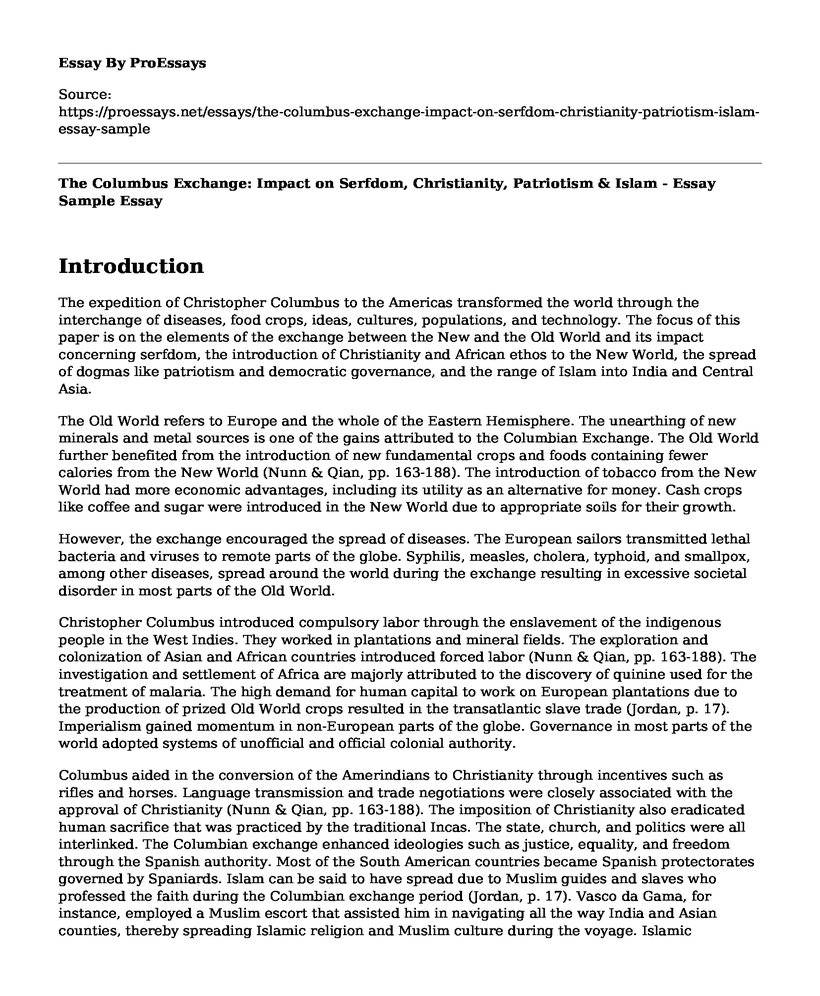Introduction
The expedition of Christopher Columbus to the Americas transformed the world through the interchange of diseases, food crops, ideas, cultures, populations, and technology. The focus of this paper is on the elements of the exchange between the New and the Old World and its impact concerning serfdom, the introduction of Christianity and African ethos to the New World, the spread of dogmas like patriotism and democratic governance, and the range of Islam into India and Central Asia.
The Old World refers to Europe and the whole of the Eastern Hemisphere. The unearthing of new minerals and metal sources is one of the gains attributed to the Columbian Exchange. The Old World further benefited from the introduction of new fundamental crops and foods containing fewer calories from the New World (Nunn & Qian, pp. 163-188). The introduction of tobacco from the New World had more economic advantages, including its utility as an alternative for money. Cash crops like coffee and sugar were introduced in the New World due to appropriate soils for their growth.
However, the exchange encouraged the spread of diseases. The European sailors transmitted lethal bacteria and viruses to remote parts of the globe. Syphilis, measles, cholera, typhoid, and smallpox, among other diseases, spread around the world during the exchange resulting in excessive societal disorder in most parts of the Old World.
Christopher Columbus introduced compulsory labor through the enslavement of the indigenous people in the West Indies. They worked in plantations and mineral fields. The exploration and colonization of Asian and African countries introduced forced labor (Nunn & Qian, pp. 163-188). The investigation and settlement of Africa are majorly attributed to the discovery of quinine used for the treatment of malaria. The high demand for human capital to work on European plantations due to the production of prized Old World crops resulted in the transatlantic slave trade (Jordan, p. 17). Imperialism gained momentum in non-European parts of the globe. Governance in most parts of the world adopted systems of unofficial and official colonial authority.
Columbus aided in the conversion of the Amerindians to Christianity through incentives such as rifles and horses. Language transmission and trade negotiations were closely associated with the approval of Christianity (Nunn & Qian, pp. 163-188). The imposition of Christianity also eradicated human sacrifice that was practiced by the traditional Incas. The state, church, and politics were all interlinked. The Columbian exchange enhanced ideologies such as justice, equality, and freedom through the Spanish authority. Most of the South American countries became Spanish protectorates governed by Spaniards. Islam can be said to have spread due to Muslim guides and slaves who professed the faith during the Columbian exchange period (Jordan, p. 17). Vasco da Gama, for instance, employed a Muslim escort that assisted him in navigating all the way India and Asian counties, thereby spreading Islamic religion and Muslim culture during the voyage. Islamic influences gained recognition slowly, although Christianity was the dominant religion spread around the globe during the exchange period.
Besides, Africans enslaved aided in the spread of their culture in the New World, while at the same time adopting European cultures and religious practices. The Columbian Exchange opened the world to great opportunities, while at the same time, brought devastating effects to the social order of most native population (Jordan, p. 17). The diet consumed, the diseases and their cure, the various blend of cultures, and the ideologies that define our societal order, across the globe, resulted from the Columbian exchange.
Works Cited
Jordan, I. King. "The Columbian Exchange as a source of adaptive introgression in human populations." Biology direct 11.1 (2016): 17. Retrieved from https://biologydirect.biomedcentral.com/articles/10.1186/s13062-016-0121-x
Nunn, Nathan, and Nancy Qian. "The Columbian exchange: A history of disease, food, and ideas." Journal of Economic Perspectives 24.2 (2010): 163-188. Retrieved from http://www.jstor.org/stable/25703506
Cite this page
The Columbus Exchange: Impact on Serfdom, Christianity, Patriotism & Islam - Essay Sample. (2023, Mar 22). Retrieved from https://proessays.net/essays/the-columbus-exchange-impact-on-serfdom-christianity-patriotism-islam-essay-sample
If you are the original author of this essay and no longer wish to have it published on the ProEssays website, please click below to request its removal:
- The Geopolitical Theme on the Syrian War
- Book Review Example: The Texas Cherokees
- Isaac Newton Biography
- Essay Example on Artist Sam Gilliam's Mental Health Fight: A Case Study
- Documentary Analysis Essay Sample on Welcome to Leith
- Richard Allen: Black Leader Lacked Patience for American Revolution, Abolishing Slavery - Essay Sample
- The Ideas of Lev Vygotsky Definitions Essay







